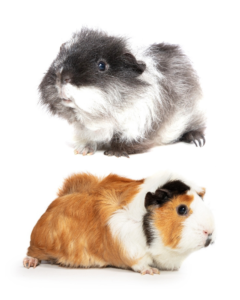 Nemo and Dory the female guinea pigs were brought to us in April after being abandoned on the side of the road. The poor girls were in a terrible state, living in a small, dirty cage.
Nemo and Dory the female guinea pigs were brought to us in April after being abandoned on the side of the road. The poor girls were in a terrible state, living in a small, dirty cage.
The pair were both suffering from a major mite infestation, causing Dory to chew her back raw, so we swiftly gave them mite treatment. Nemo also had a fungal infection and dandruff, and both guinea pigs had cracked, dry and swollen skin on their feet.
The girls needed specialist care, so we reached out to Porsche from Porsches Rescue to see if she could help rehabilitate and rehome Nemo and Dory. Porsche’s Rescue always does an amazing job with pocket pets and has a great success rate of rehoming guinea pigs.
Porsche took Nemo and Dory on with open arms and was quick to get them back in good health. In her care, Nemo’s fungal infection and dandruff cleared up and Dory’s wounds healed, allowing her fur to grow out.
Before going up for adoption, Nemo and Dory were placed in quarantine to heal and ensure they weren’t pregnant. Turns out they’re just a bit chunky…
The girls both have the most calm and placid nature, so after a little bit of patience, they were adopted into their forever home!
Nemo and Dory’s situation highlights how important it is to provide guinea pigs with appropriate living conditions, to avoid stress and vulnerability to all sorts of illness. With the help of our Animal Care Manager & Veterinarian Dr Renae Jackson and a few tips from Porsches Rescue, we’ve put together a guide to guinea pig housing and enrichment, feeding, and health and veterinary care.
Housing and Enrichment
A hutch/cage serves as the basis for guinea pig housing, but they are temporary enclosures only. It is important that guinea pigs are given an opportunity to exercise outside of their hutch/cage for a few hours every day in unfiltered natural sunlight. The hutch/cage needs to be safe and secure and provide protection from the elements and predators. For one guinea pig, the cage should be at least 7.5 square feet. For two guinea pigs, 10.5 square foot is recommended.
Indoor enclosures should be secure and kept in a sun-free, low traffic area. Keeping them permanently outdoors is not recommended as they get hot in the warmer months. Guinea pigs can tolerate temperatures between 18C – 20C, anything more than 25C can lead to heat stroke. To help keep them cool in the warmer months, you can:
- house them indoors
- provide lots of fresh water, ice packs/frozen water bottles, damp towels, frozen ice treats
- provide tiles inside the hutch/cage, fan or air conditioner, ice/gel packs.
A hutch/cage needs to be easy to clean so that soiled bedding can be removed daily. As Porsche notes, keeping bedding fresh is important to keep your guinea pigs’ bums dry and clean. The entire hutch should be cleaned at least once or twice a week. Guinea pigs should be given suitable bedding such as hay, straw or shredded paper, which should be changed regularly.
Porsche adds that surfaces like wire or hard flooring can lead to a condition called bumble foot, a very painful infection of the foot pad.
Naturally, guinea pigs live in groups and in burrows underground either dug by themselves or other animals. It’s a good idea to provide your guinea pig with a similar form of ‘safe’ place, so they can hide in their ‘burrow’ if they feel frightened. A burrow can be simulated in the form of an upturned box or a covered corner of the room. These safe holes help the guinea pig to feel more secure in their environment. Guinea pigs will also love some toys to play with; wooden toys, tunnels and balls can be great!
Guinea pigs can be trained to use a litter tray or a particular toilet area. Suitable litter material includes hay, straw and some cat litters (avoid clay types). This will have to be changed regularly.
If your guinea pig is having a free play, ensure your home is guinea pig-proofed; they can chew electrical cords and hide well!
Feeding
It is vital that your guinea pig has adequate nutrition that is high in fibre. Providing a good quality grass hay (timothy or oaten), and fruit and vegetables (one cup per day) will ensure your guinea pig is provided with enough minerals and nutrients. They like capsicum, coriander, kale, cos lettuce and leafy greens. Always check the nutritional content of any pellet/mixes.
Health and Disease Prevention
While they don’t need regular vaccinations, routine veterinary examinations are a must for guinea pigs. Even if your guinea pig isn’t exhibiting signs of malaise or pain, it’s crucial to take them in for a veterinary examination at least once every 12 months. It’s also important to take your guinea pig to the vet if it’s injured or if anything else seems different in terms of behaviour or health. Some signs that may indicate illness or pain in your guinea pig include:
- runny discharge of the nose or eyes
- abnormal bleeding
- changes in water consumption patterns
- bloody urine
- problems breathing
- diarrhoea
- rapid weight gain or loss
- decreased body temperature
- contact sensitivity
- lethargy
- decreased energy
- irregularities with the skin
- difficulty walking
- swelling.
It is recommended you take your guinea pig to a specialist vet for desexing and microchipping. Desexing reduces aggression, urine spraying and mammary cancers. It will prevent also prevent unwanted pregnancies as guinea pigs can start to breed at 4 weeks old.
If you intend to keep more than one guinea pig (they are very social animals and love having companions), suitable mixes include:
- one male and one female (only if they are desexed)
- two desexed males or females.
It is not advisable to mix guinea pigs with rabbits as they can bully each other and transfer diseases to each other. You should make an effort to bond your guinea pigs through slow introductions. Further research on this subject will start you off on the right track.
As with any pet, owning a guinea pig is a commitment of love, energy, time and resources, and that involves everything from regular interaction, veterinary care and beyond. But as any guinea pig owner would know, when you give them the care they need, they pay you back tenfold with their fun, loveable personalities!




 MON-SUN:
MON-SUN:
 02 9587 9611
02 9587 9611 INFO@SYDNEYDOGSANDCATSHOME.ORG
INFO@SYDNEYDOGSANDCATSHOME.ORG





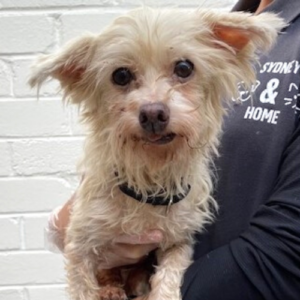 Treatment went underway, with our vet team emptying her anal sacs, giving her a bath, clipping our her matted fur and running blood tests to check for signs of underlying disease, which fortunately came back negative. The team suspected Primrose’s dental disease was so bad, she may have an infection extending to her jaw bone, so she started on a long course of antibiotics.
Treatment went underway, with our vet team emptying her anal sacs, giving her a bath, clipping our her matted fur and running blood tests to check for signs of underlying disease, which fortunately came back negative. The team suspected Primrose’s dental disease was so bad, she may have an infection extending to her jaw bone, so she started on a long course of antibiotics.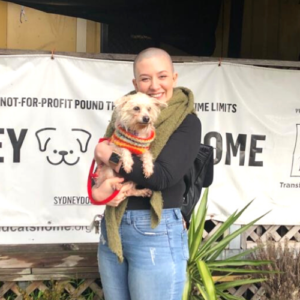 Primrose was adopted in June by Elle and has been settling really well in to her forever home. She’s even made friends with her ex-battery hen housemate! Her fur has filled out, she’s gained weight and she has the most endearing gummy smile.
Primrose was adopted in June by Elle and has been settling really well in to her forever home. She’s even made friends with her ex-battery hen housemate! Her fur has filled out, she’s gained weight and she has the most endearing gummy smile.
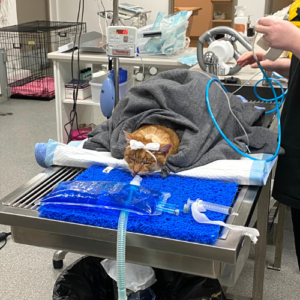 Our vet team were concerned Crumpet’s jaw issue might indicate cancer, so a bone biopsy sample was sent to pathologists. Thankfully, no cancer was found, with his results indicating a bone infection, which was easily treated with antibiotics
Our vet team were concerned Crumpet’s jaw issue might indicate cancer, so a bone biopsy sample was sent to pathologists. Thankfully, no cancer was found, with his results indicating a bone infection, which was easily treated with antibiotics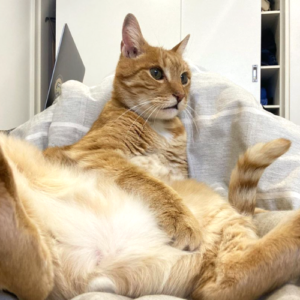 Meanwhile, Alicia was growing quite fond of Crumpet. She’d fostered several pets before and is normally a dog-person, so thought fostering cats would make it easier to let go. Crumpet proved her wrong!
Meanwhile, Alicia was growing quite fond of Crumpet. She’d fostered several pets before and is normally a dog-person, so thought fostering cats would make it easier to let go. Crumpet proved her wrong!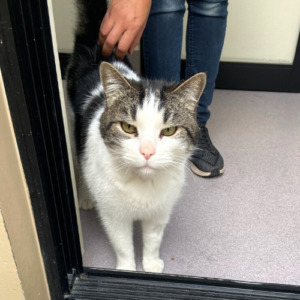
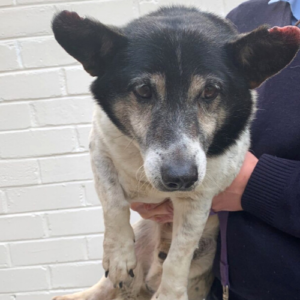
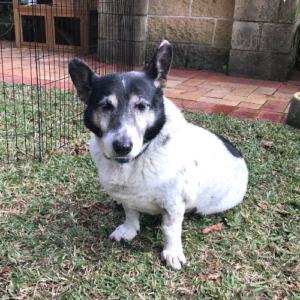

Recent Comments